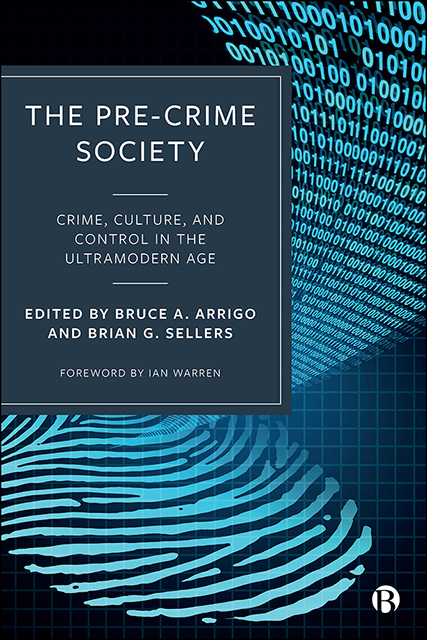Book contents
- Frontmatter
- Dedication
- Contents
- Notes on Contributors
- Foreword
- Introduction: The Ultramodern Age of Criminology, Control Societies and ‘Dividual’ Justice Policy
- Part I Theories, Theorists and Theoretical Perspectives
- Part II Institutions, Organizations and the Surveillance Industrial Complex
- Part III Dataveillance, Governance and Policing Control Societies
- Part IV Systems of Surveillance, Discipline and the New Penology
- Part V Globalizing Surveillance, Human Rights and (In)Security
- Afterword: ‘Pre-Crime’ Technologies and the Myth of Race Neutrality
- Index
16 - The Digital Technologies of Rehabilitation and Reentry
Published online by Cambridge University Press: 14 April 2023
- Frontmatter
- Dedication
- Contents
- Notes on Contributors
- Foreword
- Introduction: The Ultramodern Age of Criminology, Control Societies and ‘Dividual’ Justice Policy
- Part I Theories, Theorists and Theoretical Perspectives
- Part II Institutions, Organizations and the Surveillance Industrial Complex
- Part III Dataveillance, Governance and Policing Control Societies
- Part IV Systems of Surveillance, Discipline and the New Penology
- Part V Globalizing Surveillance, Human Rights and (In)Security
- Afterword: ‘Pre-Crime’ Technologies and the Myth of Race Neutrality
- Index
Summary
Introduction
The reentry process for formerly incarcerated people is fraught with uncertainty and there is a long list of tasks that needs to be achieved for them to successfully reintegrate back into society (Petersilia, 2003; Mears & Cochran, 2014). Upon release, returning citizens (RCs) need to find housing, secure employment, reconnect with family and their communities, continue substance treatment (if required) and maintain regular contact with their parole or probation officer. In addition, many returning citizens who served longer sentences re-enter a society that is very different from the one they left when starting their sentence. The fast-paced developments in digital technologies over the last 20 years and the ubiquitousness of the Internet and digital devices has changed the way societies work, which leaves returning citizens overwhelmed by a speed-of-light society (Jewkes & Reisdorf, 2016; Reisdorf & Jewkes, 2016). Even short spans of disconnection from the Internet and digital devices have been shown to have negative effects, such as missing out on benefits or job offers (Gonzales, 2016; Gonzales et al, 2016).
As Internet access in correctional facilities in the United States is generally not available to incarcerated people, returning citizens inevitably experience periods of disconnection. However, these technologies are necessary for many everyday life tasks and by 2021, people will manage over 85 per cent of their interactions without interacting with a human (Pirzada & Khan, 2013). Companies across most industries have digitized their operations and processes. As a result, today's jobseekers require skills to help them bridge this digital divide. Digital skills can ‘reduce poverty level to some extent and increase an employment rate or at least a basic step towards securing higher paying jobs’ (Pirzada & Khan, 2013, p. 124). In other words, a strong digital skillset is no longer a luxury for individuals—gaining digital skills is a fundamental component in navigating day-to-day life.
Most reentry programs do not include any digital skills training. However, in recent years, some efforts have been made to address these issues for RCs, including Rhode Island's ‘Pivot the Hustle’ reentry program (Pivot the Hustle, n.d.), San Quentin's ‘Last Mile’ project (The Last Mile—Paving The Road To Success, n.d.), and New York City's ‘Tech 101’ (Tech 101, n.d.), run by the Prisoner Reentry Institute (PRI) at the John Jay College of Criminal Justice.
- Type
- Chapter
- Information
- The Pre-Crime SocietyCrime, Culture and Control in the Ultramodern Age, pp. 365 - 386Publisher: Bristol University PressPrint publication year: 2021

